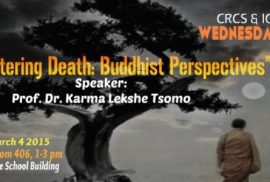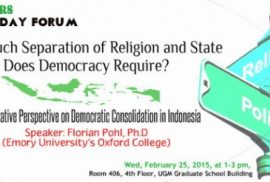ABSTRACT:
Death is an inescapable reality for all human beings, but we generally try to avoid the topic. If we’re in denial, though, how will we deal with death when the time comes? The Buddha’s confrontations with old age, sickness, and death turned him toward the spiritual quest.
After his awakening, he taught many methods of meditation, including contemplations on death and dying. As Buddhism spread to countries throughout Asia, attitudes toward death and dying inevitably changed, influenced by indigenous beliefs and practices. This presentation will explore basic Buddhist teachings on death and afterlife, as well as cultural variation.
SPEAKER:
Karma Lekshe Tsomo is a professor of Theology and Religious Studies at the University of San Diego where she teaches Buddhism, World Religions, and Death and Afterlife. She received a doctorate in Comparative Philosophy from the University of Hawai‘i, with research on death and identity in China and Tibet.
She is co-coordinator of the 14th Sakyadhita International Conference on Buddhist Women and director of Jamyang Foundation, an innovative education project for women in developing countries. Her publications include Into the Jaws of Yama: Buddhism, Bioethics, and Death and nine edited volumes on women in Buddhism.
Wednesday Forum News
ABSTRACT
A comparative Perspective on Democratic Consolidation in Indonesia.
The presentation examines questions and problems that are now central to modern political debates about the role of religion in politics, especially about questions of democratic transformation and consolidation in new democracies. Unfortunately, though the role of religion in world affairs is one of the most important and difficult issues of our era, it has also been one of the least studied themes in political science.
In the first generation of democratization theory the two most neglected areas were nationalism and religion. From the mid-1990s, this space has been occupied largely by the discourse generated by Samuel Huntington’s The Clash of Civilizations with its assumptions about the incompatibility of many of the world’s religious traditions with democracy. Whatever the normative theories of secularism and democracy may be, empirically democracy seems to co-exist with a great variety of patterns of separation of religion and the state.
The analysis of the space Islam occupies in a modern democratic state like Indonesia provides significant insights into questions of what democracy actually requires vis-à-vis secularism and challenges democratic theorists, comparativists and policy activists to re-examine the terms of the debate and to provide new conceptual and policy alternatives where appropriate.
SPEAKER
Florian Pohl is Associate Professor in Religion at Emory University’s Oxford College. A native of Hamburg, Germany, Pohl earned his Ph.D. in Religion from Temple University, Philadelphia in 2007, after completing an M.A. in Religion at Temple in 1998 and a Diplom Theologe at Universität Hamburg in 2001. His research examines publicly and politically influential expressions of Islam in contemporary Indonesia. A focus of his work has been the role of Islamic educational institutions in Indonesia’s process of democratic transition and accommodation.
He is the author of Islamic Education and the Public Sphere: Today’s Pesantren in Indonesia (Muenster/New York: Waxmann, 2009). Among his recent publications is “Islamic Education and the Limitations of Fundamentalism as an Analytical Category,” in Fundamentalism Reconsidered: Perspectives on Religion, Secularism, and Modernity, ed. David H. Watt and Simon Wood (Columbia, SC: University of South Carolina Press, 2014), 217-234. He currently serves as a Fulbright US Senior Scholar in the Department of Religious Studies at the Walisongo State Islamic University (Universitas Islam Negeri Walisongo) in Semarang, Indonesia.
The presentations slides of Wednesday Forum, Sept. 4th 2013, “Bridging Interfaith Dialogue Through The Virgin Mary” can be downloaded below:
1. Sharing Mary-Marlies Ter Borg.
2. FACE OF MARY- Dr. Fredrik Y.A. Doeka.
3. Gender Issues on Sharing Mary-Alimatul Qibtiyyah.
We invite you to come to our Wednesday Forum every wednesday at 1-3 PM, room 406, 4th floor of Graduate School Building, UGM. Jl. Teknika Utara, Pogung, Yogyakarta.
CRCS-ICRS Wednesday Forum
Indonesian And Western Social Imaginaries
September 12, 2012 (12:30 – 14:30pm)
Venue: ROOM 306, UGM Graduate School Building 3rd floor.
Abstract
Western social theory is frequently based on a paradigm of development from traditional societies to modernity. This paper argues that there is not one “modernity” but rather multiple modernities. Linear “progress” is part of a Western social imagination of development from simple, irrational, religious, traditional societies to complex, rational modern societies ruled by science. The paper suggests that how Indonesians imagine social reality is different from how people in the West imagine society. However not all Indonesians imagine the same social reality. Using Weberian ideal types, the paper suggests that part of the diversity in Indonesian society stems from competing social imaginaries, not just between “East” and “West”, but between different combinations of practices, stories, hopes, beliefs and imaginations which come from many different sources.





